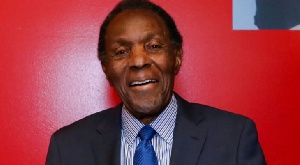 Rafer Johnson became a longtime friend of American politician, Robert F. Kennedy
Rafer Johnson became a longtime friend of American politician, Robert F. Kennedy
Rafer Johnson, a Black American athlete, and actor who won a gold medal in the decathlon at the 1960 Olympic Games in Rome died Wednesday aged 86.
The Olympic legend died at his home in the Sherman Oaks section of Los Angeles, according to his family. The cause of death is not known. What is however clear is that the Los Angeles legend was among the greatest athletes in the world from 1955 through his Olympic victory in 1960.
The two-time Olympic decathlon medalist who turned to acting and became a longtime friend of popular politician Robert F. Kennedy once said that the latter’s assassination was one of the most devastating moments in his life.
Born on August 18, 1934, in Hillsboro, Texas, Johnson, at the age of nine, moved with his family to the San Joaquin Valley town of Kingsburg where he attended Kingsburg high school and was part of the football, basketball, baseball, and track team.
During his junior year of high school, Johnson’s coach took him to watch athlete Bob Mathias prepare for a race. Mathias, who was also from the San Joaquin Valley, had won the 1948 Olympic decathlon and was then training for the 1952 Games. Johnson was inspired by Mathias’ hard work and training. “I decided I wanted to be the best in the world, too,” a reporter quoted Johnson as saying.
Johnson then went ahead to attend the University of California at Los Angeles, where he was captain of both the track and field teams and became student body president as well. In 1956, he qualified for the decathlon event of the Summer Olympic Games held in Melbourne, Australia that year.
The decathlon, which was not included in the Olympic Games until 1912, comprises ten events over a two-day period. In 1956, athletes took part in the events that included a series of jumps and hurdles as well as the discus throw, javelin, pole vault, and shot put. Athletes also ran a 400-meter race and the final 1500-meter. Johnson won second place and a silver medal, becoming the favorite for the Olympics in Melbourne.
By 1958, he had started training alongside another memorable UCLA track star, C. K. Yang, for the 1960 Summer Olympics in Rome, Italy. Johnson became the captain of the U.S. team during the 1960 Games and would make his mark in athletics when he won a gold medal in the decathlon. In the 1500-meter race, Johnson finished only 1.2 seconds behind Yang in the Games and won the gold medal.
After the Rome Olympics, Johnson retired from competition and began acting in movies, making appearances in The Six Million Dollar Man, Wild in the Country with Elvis Presley, None But the Brave with Frank Sinatra and the James Bond film License to Kill. In the mid-’50s, he also worked briefly as a TV sportscaster before he volunteered for Democratic presidential hopeful Kennedy in 1968. The Olympian had met Kennedy in 1961, and the two had become close. Johnson would then be seen at rallies and other campaign events of Kennedy after he announced his presidential bid in 1968.
And he was present on June 5, 1968, when Kennedy addressed a crowd that showed up to celebrate his win in the California Democratic presidential primary. Just after midnight, as the politician left the main ballroom through the kitchen, he was shot multiple times by Sirhan Sirhan. Johnson, along with NFL star Rosey Grier and others helped disarm the gunman after he shot Kennedy, who died the next day.
Here’s Johnson’s account of the aftermath of the shooting:
“As I walked into that area I was with Mrs. Kennedy and I heard what I thought were balloons popping. I look across the room I see smoke coming from the gun.
“I made my way toward the gun. I was so far away I could see everything going on. I just made the move. I was the first one there and I put my hand on the gun hand. Shortly after I arrived Roosevelt Grier came, grabbed my hand. And we both, three, fell to the floor.
“He was in trouble there and we asked the people not to kick him. So I eventually told Rosie to let my hand go. Then we had to literally peel Sirhan away from the gun. I took the gun and put it in my pocket.
“Next day I woke up, put on my jacket, and noticed it was heavy on one side. I still had the gun in my pocket. I called the police, they came and picked me up and took me to the station.”
The incident left Johnson scarred. He would later get involved in the Special Olympics, a competition for developmentally and physically disabled kids and adults. With a number of awards and accolades, Johnson was chosen to ignite the Olympic Flame during the opening ceremonies of the 1984 Summer Olympics in Los Angeles. According to media reports, the Coliseum torch was re-lit Wednesday in the athlete’s memory and remained aflame until sundown. On Thursday, it will be lighted again from sunup to sundown.
Johnson was survived by his wife and children (who were athletes themselves) as well as his son-in-law Kevin Jordan and four grandchildren.